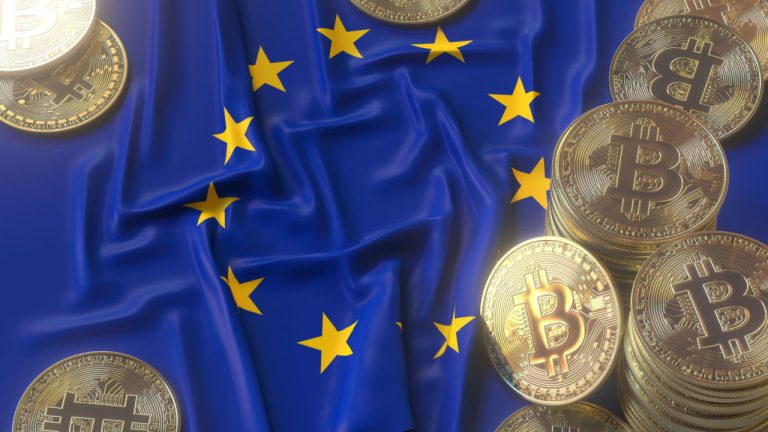 The Council of the European Union has given its final approval to new regulations for crypto assets and markets in the EU. The decision completes a lengthy and complex legislative process for what’s considered to be the world’s first comprehensive legal framework for digital assets like bitcoin. EU Finance Ministers Give Final Nod to Markets […]
The Council of the European Union has given its final approval to new regulations for crypto assets and markets in the EU. The decision completes a lengthy and complex legislative process for what’s considered to be the world’s first comprehensive legal framework for digital assets like bitcoin. EU Finance Ministers Give Final Nod to Markets […]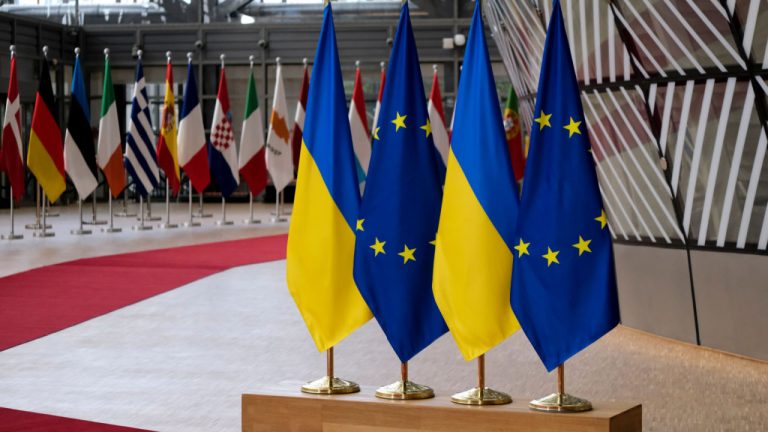 Officials have revealed that Ukraine intends to implement the crypto market rules approved by the European Parliament. While the government is already moving in that direction, the tax service has issued a clarification regarding the taxation of income resulting from cryptocurrency transactions. Ukraine Set to Incorporate EU Crypto Regulations Into National Law A regional leader […]
Officials have revealed that Ukraine intends to implement the crypto market rules approved by the European Parliament. While the government is already moving in that direction, the tax service has issued a clarification regarding the taxation of income resulting from cryptocurrency transactions. Ukraine Set to Incorporate EU Crypto Regulations Into National Law A regional leader […]
What is the potential impact of MiCA on the EU crypto and blockchain market, and what other regulations can be expected for this rapidly evolving industry?
On April 20, the European Parliament voted to pass the Markets in Crypto-Assets (MiCA) regulation, the European Union’s main legislative proposal to oversee the crypto industry in its member countries.
The MiCA regulation is a significant development for the crypto industry in the European Union. Prior to MiCA, crypto companies had to comply with 27 different regulatory frameworks across the EU member states, with Germany or France being costly and burdensome, for example.
Under MiCA, however, EU-wide regulations will apply, allowing companies to operate throughout the entire EU crypto market with a MiCA license granted in one country. This will increase the competitiveness of EU startups and may result in them gaining market share from unregulated competitors.
Moreover, MiCA could encourage more institutional adoption and activity in the EU crypto and blockchain market. Patrick Hansen, director of EU strategy and policy at stablecoin issuer Circle, told Cointelegraph that MiCA will enable European crypto firms to scale and grow faster, allowing licensed companies to offer their services throughout the world’s largest single market, with roughly 450 million people:
“The legal clarity will also foster innovation amongst financial institutions that have been previously hesitant to launch products and services due to regulatory uncertainty. Additionally, as MiCA is the first comprehensive regulatory framework for crypto assets from a major jurisdiction in the world, it is likely to attract considerable foreign capital and talent to the region.”
For Moritz Schildt, a board member of the Hanseatic Blockchain Institute and the German Blockchain Association, the biggest advantage of MiCA is that “it will come into force already this year,” giving the EU a chance to provide a unified regulatory framework for crypto assets and related providers.
Magazine: Here’s how Ethereum’s ZK-rollups can become interoperable
Creating a regulatory framework for a technology that sees new developments and outgrowths practically every month and evolves as dynamically as the tokenization of investment opportunities is “very challenging.”
“It should come as no surprise, therefore, that some regulations are not yet optimal and that questions about concrete applications remain unanswered,” Schildt said, adding that with MiCA, Europe has the opportunity to position itself “as a location for innovation and quality.”
Peter Grosskopf, co-founder of decentralized finance (DeFi) project Unstoppable Finance, is also convinced that MiCA will benefit the EU crypto and blockchain market. First, companies from outside Europe will have to register with a company in the EU, so there is a “direct impact on job creation and tax payments.”
Second, many jurisdictions take an overly strict approach to regulating crypto. For example, “the U.S. does regulation by enforcement.” Compared with other regions, the EU will become “a safe space for the industry as a whole, and innovators from around the world will start to build their businesses here,” Grosskopf said.
Stefan Berger also noted that the United States is currently cracking down on the crypto sector. According to the German politician and European Union Parliament rapporteur for MiCA, the European crypto asset industry has regulatory clarity that the United States doesn’t, and it would be wise for U.S. lawmakers to take a cue from MiCA:
“For me, the biggest advantage is that we create trust, which is a crucial booster, especially for young technologies like blockchain. I expect regulation to become a global standard-setter over time. A global MiCA would be desirable at some point.”
Through MiCA, European policymakers are trying to create a reliable framework that builds trust through legal certainty. This includes a uniform classification of assets and the requirement for coin issuers to provide a white paper that discloses all relevant information about the coins, such as their energy consumption and environmental impact.
In addition, MiCA will ensure that every new token is reviewed for approval to check that the business model does not threaten the stability of the cryptocurrency, which creates more transparency for investors.
But the crypto and blockchain sector is constantly evolving. “Tokenization is not hype and will become an integral part of our lives and financial world,” said Berger. More and more business models are emerging based on nonfungible tokens (NFTs), for example, which have been largely exempt from MiCA. (The new regulation will only address crypto-asset service providers that offer services for NFTs).
But according to Berger, NFTs are next on the docket, with European lawmakers looking at what type of regulation would benefit the industry and consumers.
Schildt also expects further regulations on NFTs relatively soon. “We should reconsider the traditional classification of investment products.” According to the expert, in the future, investments “that were previously considered ‘art collections,’ we will also qualify as capital investments.”
Some aspects of MiCA have yet to be defined through upcoming technical standards and guidelines.
For example, what are the specific liquidity requirements for electronic money token reserves? EU regulators will develop these standards over the next 12 to 18 months, and “the practical success of MiCA will largely depend on this implementation work — also referred to as Level 2 legislation,” Circle’s Hansen said.
Hansen further noted that, beyond MiCA, EU institutions are finalizing a new Anti-Money Laundering (AML) rulebook that will be “critical for crypto firms.”
Another critical review is that of PSD2, the EU’s main payments directive, which will also significantly impact crypto firms.
And finally, in about 18 months, the European Commission will publish a detailed report on DeFi and may take further legislative steps to regulate the space. “Brussels prides itself on being a global regulatory leader, and MiCA is just the first of many steps to come,” said Hansen.
MiCA will NOT apply to "crypto-asset services provided in a fully decentralised manner without any intermediary"
— Blockchain for Europe (@BlockchainforEU) April 15, 2023
The @EU_Commission will produce a report in 18 months assessing the "necessity and feasibility of regulating #DeFi" pic.twitter.com/utM4kOw4SM
Unstoppable Finance’s Grosskopf also expects DeFi regulation to become a hot topic following the next round of elections in Europe, as MiCA will not apply to “crypto-asset services provided in a fully decentralised manner without any intermediary.”
Recent: Foreign trade and pensions: What’s next for Russia’s CBDC project?
“I think it’s important to be proactive and start thinking about how to regulate DeFi as early as possible in order to influence the process,” he said, stating that the new AML regulation is currently under discussion and will most likely become a reality before MiCA.
Although it’s still unclear exactly how European lawmakers will regulate NFT and DeFi or whether there will be new requirements regarding smart contracts, the success of the first step toward regulation — MiCA — could provide a significant boost to both EU crypto businesses and the EU economy as a whole. However, whether this success is realized will depend on the practical implementation standards developed in the future.

A principal economist of the European Commission shares his views on stablecoins and the future of regulations in Europe.
In October 2022, the European Union finalized the text of its regulatory framework called Markets in Crypto-Assets or MiCA. The final vote on the new regulation is scheduled for April 19, 2023, meaning the days of an unregulated crypto market in the EU may soon be over. The MiCA regulations introduce clear guidelines for handling cryptocurrencies and consumer protection, and divide crypto assets into different sectors, each subject to specific rules.
The European Commission — the executive branch of the EU responsible for proposing new laws — first proposed the far-reaching regulations in 2020. The MiCA would apply to crypto service providers and issuers of digital assets in 27 EU member countries. By proposing to regulate crypto assets, the European Commission has taken a bold step, displaying the capacity and will to address complex issues creatively.
Joachim Schwerin is the principal economist at the Digital Transformation of Industry unit within the European Commission’s Directorate General for the Internal Market, Industry, Entrepreneurship and SMEs (DG GROW).
Schwerin is responsible for policy development regarding various aspects of token creation, its distribution and regulation (token economy), and the economic applications of distributed ledger technologies.
In 2020, Schwerin coordinated DG GROW’s input into the EU’s Digital Finance Strategy, including MiCA. Speaking to Cointelegraph, Schwerin shared his views on the importance of MiCA, the role of stablecoins, and why he hasn’t ever questioned the merits of blockchain and crypto, even in the wake of Terra’s collapse or the FTX crash.
With MiCA, the European Commission has adopted a regulatory framework that should minimize the negative consequences of incidents like the insolvencies of FTX and BlockFi in the future. The law was not in force at the time of the FTX case, but Schwerin hopes it will come as soon as possible, saying this should “clearly underpin the precautionary principle.”
“We promote the crypto sector and want to support its organic, market-driven development. The many positive opportunities should be recognized and used. It is like in sports here: Defending can make sense in certain phases of the game, but mostly defending means that a team is too bad to take the game into its own hands. We want to develop and promote, not slow down.”
For Schwerin, FTX was a typical case of an emerging and relatively unregulated industry finding its footing and developing its products and services. Indeed, he stated incidents like FTX and Terra’s collapse provided a chance for the cryptocurrency community to rally, condemn illicit behaviors and work to rebuild the industry’s reputation.
Joachim Schwerin, from @EU_Growth, illustrated his presentation with examples of healthcare institutions which use #Blockchain to manage their supply chains or to access research and data.#ECNCrowdCon2019 pic.twitter.com/UcpCQN9Ca9
— EURADA (@Eurada_RDAs) October 25, 2019
The crypto community is now focusing even more on better rule-setting and compliance in regulated or soon-to-be-regulated environments. It’s also looking more at truly decentralized mechanisms to reduce the potential for error by empowered individuals, Schwering added.
“All of this is positive and does not change the narrative of crypto as a success story with much more future potential.”
Schwerin sees the benefit of blockchain technology primarily in applications for the real economy. He said that Bitcoin (BTC) and other cryptocurrencies are “nice and fascinating with lasting significance,” but these are private concepts and “we don’t need to spend public resources on them.”
Schwerin is confident that the benefits for small businesses and the general population must be evident if the government will tackle something with public resources. And this is precisely the potential that blockchain has:
“That’s why, from the beginning, we didn’t see blockchain primarily as a technology but as a philosophy. [We saw it] as something that enables a true form of decentralization that creates trust; trustworthy technology that also opens up market opportunities for small businesses worldwide and allows many people with the same interests — but who don’t know each other — to come together digitally in the real world and develop projects.”
Recent: First of many? How Italy’s ChatGPT ban could trigger a wave of AI regulation
The European Commission had this understanding of blockchain technology in mind when discussing dubious initial coin offerings from 2017 to 2018, or that money laundering was supposedly easier with crypto.
But European regulators understood that blockchain technology’s nature — thanks to its transparency and traceability — makes it much easier to track crypto transactions, and distinguish between regular and illicit activities on-chain.
According to Schwerin, financial crime related to cryptocurrencies is much lower than in traditional forms of finance.
“That is why we did not depend on any examples of criminality or the Terra case, just as we did not depend on FTX or any next case of that sort, but we were and are 100% convinced of the technology. We got involved with it early on, and because of that, we had already learned so much by then that we were in a position to work on the MiCA regulation in record time.”
After the collapse of the Terra ecosystem, the European Central Bank (ECB) issued a report claiming that stablecoins posed a threat to financial stability, but Schwerin does not share this view.
According to him, society needs stablecoins in many different forms because they have important functions within the crypto space, like cushioning price fluctuations and facilitating transactions; this is why the European Commission has allowed stablecoins in principle in the MiCA regulation.
“We have not banned anything, but we have developed basic rules for private stablecoin issuers that we think are reasonable. For example, they must have appropriate minimum liquidity as a reserve”.
Regarding Terra, Schwerin sees the whole thing as a learning process, saying, “The next similar project will simply be better because people have already had this experience. It is a natural evolution of innovation.”
Despite this, there are doubts about whether stablecoins will find a home in the EU. The largest stablecoins — Tether (USDT) and USD Coin (USDC) — are pegged to the United States dollar, with Circle’s euro-pegged stablecoin also issued outside the eurozone. When MiCA comes into force, should we expect more euro stablecoins?
Schwerin hasn’t ruled out the emergence of new euro stablecoins in the EU, but he isn’t expectant either. He says that the macroeconomic context, geopolitics, monetary policy and the euro are simply not moving in that direction.
The MiCA alone is unlikely to significantly increase the number of euro-denominated stablecoins in the euro area, Schwerin stated. “However, MiCA could help us to become more open to stablecoins as a whole.”
When asked whether MiCA could become a ground-breaking global regulatory standard, Schwerin said he sees great interest from other countries, especially the United States. In his view, MiCA is a particularly good example of a regulatory approach that is both innovative and liberal for global regulation of the financial sector.
“However, even though MiCA is ready, we have to be aware of the pace of innovation in the crypto sector and the new challenges it will bring. It was, is and continues to be a long process of learning.”
The views expressed in this interview are those of Schwerin personally and do not reflect or represent the official position of the European Commission.

European Union lawmakers are planning an EU-wide digital identity wallet for access to essential services.
On March 15, the European Parliament voted 418 to 103 (with 24 abstentions) in favor of negotiating a mandate for talks with the European Union member states about revising the new European Digital Identity (eID) framework and creating the “European Digital Identity Wallet,” also known as EUDI Wallet or EU wallet.
Citizen’s IDs, health cards, certificates and many other documents could soon be digitally stored in a smartphone application for EU citizens.
According to an official statement from the European Parliament, the system would allow citizens to identify and authenticate themselves online without relying on big commercial providers like Apple, Google, Amazon or Facebook.
The new eID framework will purportedly give EU citizens digital access to key public services across the EU. Citizens will remain in “full control of their data” and be able to “decide for themselves what information to share and with whom.”
European lawmakers have set an ambitious goal for this new wallet, aiming to bring it to 80% of the population by 2030. This could be achieved by mandating that the wallet be supported by e-government services and companies that have a legal requirement to identify their customers through Know Your Customer checks. It could require major online platforms like Google or Facebook to offer the EU wallet to log in to their services, with soft law and delegated acts that could require small and medium-sized enterprises to support the wallet.
Negotiations with the European Council on implementation would be the next step, but digital transformation and data protection experts have doubts and differing opinions about implementing the wallet.
The EU wallet — like the current electronic ID cards in Germany and other European countries — will hardly be adopted by citizens in their daily lives if it doesn’t offer a good use case.
The challenge is to make it easier and more efficient for citizens to interact with public services and administrations, enabling authentication and verification processes, especially in the private sector.
According to Clemens Schleupner, policy officer of digital identity and trust services at Germany’s digital association Bitkom, the possibility of storing electronic IDs on a smartphone to use online as well as digitizing drivers’ licenses, health cards, passports, tickets, school reports, credit cards, membership certificates, etc., and combining them into one wallet could have mass market potential.

The EUDI Wallet could make that happen; however, this will only succeed “if adoption among citizens in Europe is ensured through security and usability, relevance through a high number of possible uses and interoperability of different applications throughout Europe,” Schleupner told Cointelegraph.
Lack of usability and public awareness are also significant concerns for Christof Stein, spokesperson for Germany’s Federal Commissioner for Data Protection and Freedom of Information (BfDI).
Stein told Cointelegraph that using proven technologies and trusted infrastructures with enforced IT security and data protection standards are crucial for citizens using the EU wallet.
As the final rules are not yet known, it is too early to evaluate the EU wallet at this early stage of implementation. For citizens, it is important that the legal framework provides a data-saving solution that only lets organizations ask for user data when they need it.
According to Stein, it is critical that users are protected from tracking by wallet providers, and wallet providers must ensure that wallet data processing is in line with legal requirements.
“What is necessary is a central anchor of trust enabling the enforcement of rules for the protection of individuals. For example, the infrastructure must be designed so that all organizations participating in the system must register to ‘identify’ themselves to users.”
The previous proposal from the European Commission lacked essential privacy safeguards that would have enabled third parties to obtain data about user transactions, possibly allowing bad actors to exploit the system for identity theft or fraud.
According to Thomas Lohninger, executive director of data protection Austrian NGO epicenter.works, the European Parliament has drastically improved the law and adopted a good position in the first reading. He told Cointelegraph:
“It is unlikely that the Parliament will win 100% of the trialogue negotiations. But we hope that the Council and the Commission will realize that the success of the whole system depends on the privacy and trust that is built in. Only if it is the trusted and chosen tool of citizens for their most sensitive health, identity and financial data can the European Digital Identity Wallet be a success.”
Lohninger also warned of “over-identification,” i.e., if everyone in the EU is obliged to always use the wallet, this could lead to a loss of anonymity and pseudonymity in everyday interactions.
BfDI’s Stein shared this view, arguing that there should be no general obligation to use the EUDI Wallet and that there should be alternatives.
The European Parliament appears to have heard these concerns, as one of the most important safeguards in the recently passed identity framework is a non-discrimination clause that “protects anyone who chooses not to use the EU wallet, whether it’s in access to government services, freedom of business or the labour market.”
In the European Parliament, all four committees adopted this safeguard with a cross-party consensus. Now this safeguard must survive the trialogue — negotiations with representatives from the European Parliament, the Council of the European Union and the European Commission.
As Cointelegraph reported, the EU’s Industry, Research and Energy Committee included a standard for zero-knowledge proofs (ZK-proofs) in its eID amendments.
This technology, which allows the selective disclosure of certain information — like revealing only one’s age, for example — could become a core function of the EU wallet, said Stein.
Epicenter.work’s Lohninger noted that ZK-proofs could provide “unlikability.” For example, someone could prove they are of age to someone else on different occasions without the latter party knowing the former is the same person.
Recent: Islam and crypto: How digital assets can comply with Islamic financial law
Although ZK-proofs allow personal data to be anonymized, Schleupner sees two challenges. First, ZK-proofs in their current application are “a new technology and vulnerabilities may arise if they are not implemented properly,” and second, “many use cases [of ZK-proofs] have not yet been conclusively evaluated.”
Before trusting the technology, EU regulators must ensure that ZK-proofs comply with privacy regulations and meet all specific requirements of the General Data Protection Regulation.
The trialogue at the EU has much to consider before passing eID into a usable, safe and reliable tool for Europeans. How regulators balance these considerations could have profound implications for other formers of digital or blockchain-based ID.

Despite the ongoing tumultuous market conditions, venture capital investments in European crypto startups hit an all-time high of $5.7 billion in 2022.
2022 was a turbulent year for the crypto space, from an ongoing bear market and high-profile collapses of some of the industry’s most prominent players, like Terra and FTX. Despite the setbacks, venture capital (VC) investors continued to show support for crypto startups.
According to a new study released by European investment firm RockawayX, VC investment in crypto startups based in Europe reached its all-time high in 2022, with $5.7 billion invested
European decentralized finance startups hit $1.2 billion in 2022 — a 120% increase from the previous year’s investments of $534 million.
Viktor Fischer, the CEO of RockawayX, pointed out that the crypto market is cyclical. During the 2018 winter, “the total digital asset market cap fell by 80%, but startup funding activity held steady.”
“Investments made when digital asset prices were depressed materialized in tech and usage traction alongside ‘bull market’ price recoveries.”
Europe is also home to the highest number of crypto startups (3,977), according to the headquarters location.
However, it falls behind the United States in the number of startups with over a million dollars of funding and companies with a value of over $1 billion, knowns as unicorns.

Top global investors in European startups include Animoca Brands, Coinbase, Blockchain Capital and the Digital Currency Group.
Related: Banking crisis pushed over $286B to money market funds in two weeks: Report
In Europe, investment in startups that provide financial services made up more than half (52%) of all investments, with infrastructure and Web3 making up 32% and 16%, respectively.

However, compared with 2021, investment in financial service-based startups declined by 19%, and infrastructure grew by 24%.
Europe’s growing prominence as a crypto-friendly region comes as lawmakers in the European Union finalize the highly anticipated Markets in Crypto-Assets (MiCA) regulations.
The regulations have been postponed twice by the EU due to translation issues. Laws passed in the EU must be translated into all 24 official languages of the member states.
At the time of writing, a final vote on the MiCA rules is set for April 2023.
Magazine: Crypto winter can take a toll on hodlers’ mental health
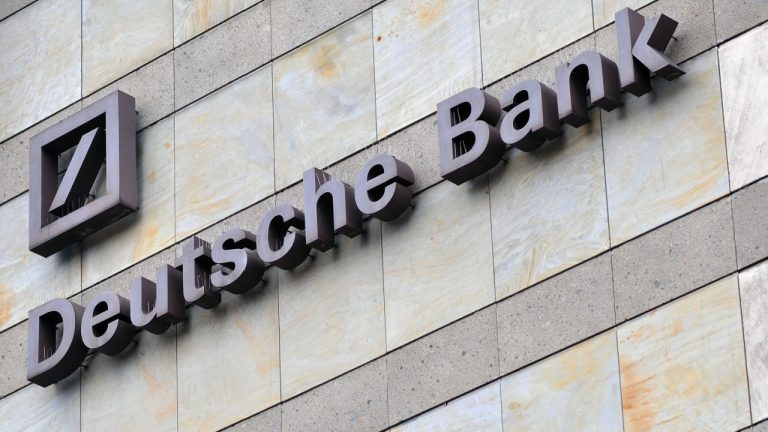 Deutsche Bank shares plunged on Friday, along with the stocks of other European banks, amid investor concerns over the stability of the global banking sector. The drop comes in the aftermath of the recent emergency rescue of Credit Suisse and follows losses in U.S. banks on Thursday. Deutsche Bank Credit Default Swaps Jump to 4-Year […]
Deutsche Bank shares plunged on Friday, along with the stocks of other European banks, amid investor concerns over the stability of the global banking sector. The drop comes in the aftermath of the recent emergency rescue of Credit Suisse and follows losses in U.S. banks on Thursday. Deutsche Bank Credit Default Swaps Jump to 4-Year […]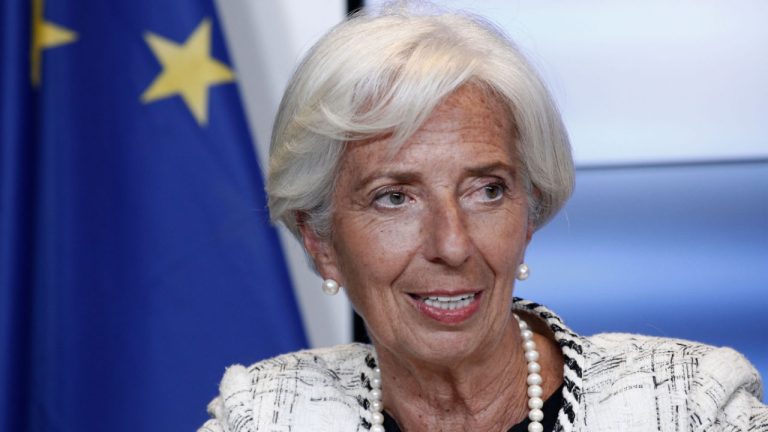 The digital euro has an important role in preserving the payment autonomy of Europe, the head of the eurozone’s monetary authority emphasized. The new currency, which is still under development, is meant to be sovereign and safe, cheap and widely available, Christine Lagarde assured during a discussion devoted to central bank digital currencies. Payment Cards […]
The digital euro has an important role in preserving the payment autonomy of Europe, the head of the eurozone’s monetary authority emphasized. The new currency, which is still under development, is meant to be sovereign and safe, cheap and widely available, Christine Lagarde assured during a discussion devoted to central bank digital currencies. Payment Cards […]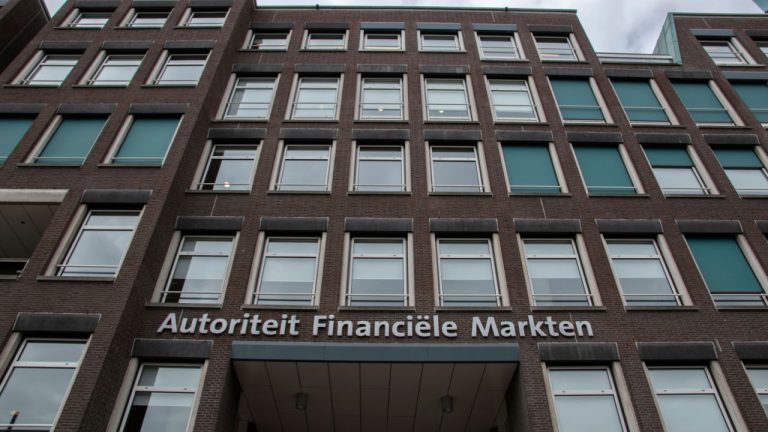 The financial regulatory body of the Netherlands intends to maintain tough attitude towards the Dutch digital assets sector despite looser European rules. The head of the agency overseeing the industry doesn’t think crypto is good news and highlights its flaws in an article. Head of Dutch Financial Authority Says Cryptos Are Difficult to Fathom, Vulnerable […]
The financial regulatory body of the Netherlands intends to maintain tough attitude towards the Dutch digital assets sector despite looser European rules. The head of the agency overseeing the industry doesn’t think crypto is good news and highlights its flaws in an article. Head of Dutch Financial Authority Says Cryptos Are Difficult to Fathom, Vulnerable […]
Margrethe Vestager, the executive vice president of the European Commission, stressed the need to anticipate and plan for changes in technological advancements.
Considering the regulatory struggle to keep up with ever-evolving innovations, Margrethe Vestager, the executive vice president of the European Commission, recommended a headstart into brainstorming implications of technologies such as the Metaverse and ChatGPT.
Vestager highlighted how digital transition and the shift to a digital economy have brought about risk and opportunities for the masses while speaking at the Keystone Conference about competition policy. She believes that legislations lag behind technological advancements, adding:
“We have certainly not been too quick to act - and this can be an important lesson for us in the future.”
While the enforcement and legislative process will continue to stay a step behind tech innovations, Vestager stressed the need to anticipate and plan for such changes. She stated:
“For example, it is already time for us to start asking what healthy competition should look like in the Metaverse, or how something like ChatGPT may change the equation.”
She also revealed that EU Commission would enforce antitrust investigations from May 2023 aimed toward the Facebook marketplace and how Meta uses ads-related data from rivals, among others.
Related: The limitations of the EU’s new cryptocurrency regulations
Feb. 15 marked the launch of the European Blockchain Regulatory Sandbox, which provides a space for regulatory dialog for 20 projects per year through 2026.
With our consulting arm OXYGY, today we announce, together with the @EU_Commission, that applications are now open for the first cohort of the European blockchain regulatory sandbox for blockchain/DLT innovators @EuropeanSandbox:#blockchain #sandbox https://t.co/ZNbjUCTubp pic.twitter.com/PtdS0oBS8p
— Bird & Bird (@twobirds) February 14, 2023
On the other end of the spectrum, European Union lawmakers are in talks about using zero-knowledge proofs for digital IDs. Cointelegraph’s report on the matter highlighted:
“The new eID would allow citizens to identify and authenticate themselves online (via a European digital identity wallet) without having to resort to commercial providers, as is the case today - a practice that raised trust, security and privacy concerns.”
Zero-knowledge proofs have recently been at the center of researchers’ attention as a possible means to ensure regulatory compliance and privacy in digital currencies.